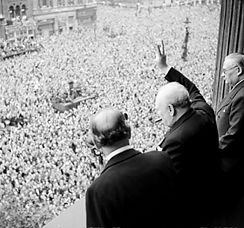
The Proliferating of the One-man Churchill Play: One Review
Play that Meddles with History
There are many current anniversaries (Dardanelles 1915, VE-Day 1945, funeral 1965; Atlantic Charter and Pearl Harbor next year). So one-man Churchill plays are multiplying. I saw one recently in New Hampshire—and left grumbling. I will not criticize the actor, who made a passable attempt at impersonation. But his play script left much to be desired.
Who writes these scripts? Do they do any research? Typically, this one vacuums every famous quote it can cram into 90 minutes and gets so many wrong that one loses count. This is not new. Why meddle with Churchill’s immortal words—which are famous for way he expressed them? Why do writers, actors and politicians insist on misquoting him?
Mangled quotations mount up fast. The great speeches—Munich, Holiday Time in America (1939), Blood Toil Tears and Sweat, Fight on the Beaches—are sometimes convincingly delivered. But every one is spoiled by detail edits that occur willy-nilly. Example: it was “victory in spite of all terror,” not “all hardship.” Churchill was too good a writer to use “hardship” when he meant terror.
Setting’s Off
This presentation is set in the Cabinet War Rooms in April 1955. Churchill has gone there to ponder his decision to resign. But Churchill despised the War Rooms, spent only a few nights there during the Blitz. He left them, never to return, in 1945. Why not stick to the facts, and set the scene at Downing Street? Moreover, the date should be February or March, since he had long made his decision to resign by April—and did so on April 5th.
Churchill did not hesitate to go because of doubt about his successor, as the play suggests (though he later wondered privately whether Anthony Eden would succeed). He decided to leave after failing to engineer a summit conference with Eisenhower and the Russians. Curiously, one of the Russians mentioned is Gorbachev—who was 24 and just graduating from university in 1955.
As in many one-man plays, Sir Winston reviews his life, which in this play was nicely paced but full of errors. Lord Randolph Churchill did not die of syphilis. Nanny Everest was three years dead when Winston’s first book appeared. Omdurman was not the final charge of British cavalry. He became prime minister on May 10th not May 4th 1940, thirty not thirty-five years after 1910, and so on.
The play correctly suggests that Churchill held Prime Minister Baldwin, not Chamberlain, chiefly responsible for Britain’s insufficient rearmament in the 1930s, and repeats WSC’s private reflection that it would have been better had Baldwin never lived. But it misattributes Churchill’s 1938 remark “embalm, cremate and bury”—which referred to avoiding risks in national defense, not to Mr. Baldwin.
More Misquotes
More lines he never uttered: “if you’re going through hell, keep going”; “jaw-jaw is better than war-war”; and the famous exchange with G.B. Shaw over Shaw’s play (“Bring a friend, if you have one….I’ll come the second night, if there is one”). To be fair, it was only recently learned that Shaw and Churchill both denied that exchange. But it’s long established that Lady Astor threatened to poison F.E. Smith’s coffee, not Churchill’s. The famous Bessie Braddock encounter (“tomorrow I’ll be sober”) and the Attlee urinal crack likely did occur, but are so edited as to deprive them of their rapier impact.
There is no record that Churchill ever said God created France for its beauty and Frenchmen to balance it, or that Roosevelt told Churchill he used a cigarette holder to stay away from cigarettes. It is nowhere believed that the United States was “pro-Nazi” before Pearl Harbor. It is untrue that in 1955 Churchill was fretting over the costs of Chartwell (it was purchased by his friends for the National Trust in 1946, providing he could live out his life there); or that Churchill planned his own funeral.
What we watched in New Hampshire was a reasonably convincing portrayal, bringing out many of Churchill’s admirable characteristics, including magnanimity and appreciation for political opponents. But the counterfactuals and misquotes, together with the impossible setting, spoil this presentation for anyone with a little knowledge of the story.
It’s too bad, because the facts are broadly known, and a writer has only to run his screed past any one of a score of Churchill institutions or scholars, who would probably be happy to vet it for free. Get it right!






